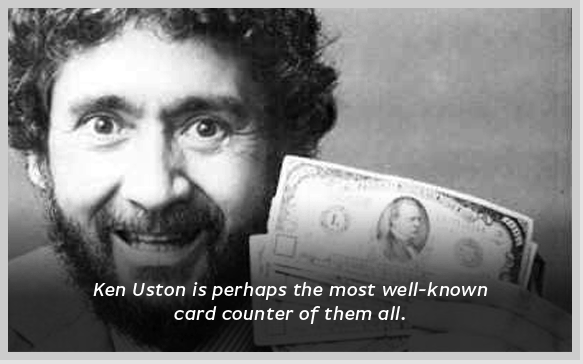Famous Card Counters
Blackjack is really the only casino game where it’s possible to beat the house using skill. When using perfect blackjack strategy the house edge is very small and you can actually gain an advantage by using a technique known as card counting. If you would like to find out more about what’s involved in counting cards you should visit our blackjack guide. It covers the subject in detail.
On this page we have provided information on some of the most famous card counters. Included are those who have successfully won money using this technique and those who have devised card counting strategies and systems. These people are legends in the gambling world but not so popular with the individuals and organizations that own casinos.
The following is a list of all the people and covered on this page. They are legends in the gambling world, and admired by many a casino player. It’s fair to say, however, that they are not so popular with the individuals and organizations who own casinos.
MIT Blackjack Team
The MIT blackjack team is quite possibly the most famous counting team of all time. It consisted of students, and ex-students, from MIT, Harvard University, Harvard Business School and other academic institutions. Originally managed by Harvard MBA graduate Bill Kaplan, the team made fortunes throughout the 1980s and early 90s using card counting and some other more advanced strategies and techniques.
The story of this team is a truly fascinating one and shows just what can be achieved through card counting and good organization. Author Ben Mezrich wrote a book, Bringing Down the House, that was largely based on their exploits and the book was subsequently used as the basis for the popular movie, 21, starring Kevin Spacey.
Edward Thorp
Among other notable achievements, Edward Thorp wrote the book “Beat the Dealer.” This book, published in 1962, was the first that actually mathematically proved that blackjack was beatable using card counting techniques. As a result, he’s commonly referred to as the godfather of card counting. He’s also considered something of a pioneer in the application of probability theory in a number of other situations, including hedge fund management.

Before writing his book, Thorp analyzed blackjack extensively and devised card counting systems using early computer technology. He also tested his systems in casinos in Reno and Las Vegas, drawing attention from security officials due to his winning ways. Word of his success circulated around the gambling community and he decided to write a book when it became clear there was a demand for his methods to be brought to a wider audience.
The Four Horseman
A few years prior to Thorp’s book in 1957, “Playing Blackjack to Win,” had been published. In many ways this book was ahead of its time, and it featured the first accurate basic strategy for playing blackjack. It also contained a very simple card counting system, which technically the authors were ahead of Thorp. Despite the relative lack of computing power back then, the basic strategy was incredibly close to being mathematically perfect.
The four authors: Roger Baldwin, Herbert Maisel, James McDermott and Wilbert Cantey were all mathematicians. They became known as “The Four Horseman of Blackjack.” Although they were convinced they had worked out the very best way to play blackjack, they were also determined they would lose in the long run and as such never really put their methods to practical use.
Ken Uston
Before his death in 1987 he had appeared on a number of television shows detailing his gambling exploits. This gave him a significant public profile outside the traditional gambling community, unmatched by many of the other names on this page.

During the 1970s he put together a number of counting teams that visited casinos all over the world and successfully won millions playing blackjack. Although team play wasn’t his idea initially, he’s regarded as the one who popularized the concept. He is also, at least partially, responsible for casinos adjusting the rules of blackjack to try and negate the advantage of a skilled player.
Having been banned from many casinos because of his success, he decided in 1979 to file a lawsuit against one of them in Atlantic City. The basis for his lawsuit, against Resorts International Hotel, was that a casino had no right to ban a player simply for using their skills. The courts agreed, and to this day Atlantic Casinos aren’t allowed to ban card counters. It was largely because of this lawsuit that casinos began taking measures such as using more decks and increasing the frequency of shuffles to make it harder for counters to be successful.
Tommy Hyland
Tommy Hyland is the manager of the longest-running known blackjack team. His team of card counters has essentially been together since 1979, although there have been some changes in personnel over the years. Hyland is said to command a great deal of loyalty, trust, and respect from his players: something which seems pretty evident. It’s believed there are around 15 members of his team currently.
It’s unknown exactly how much Hyland and his team have made over the years. Hyland himself has stated that his team initially had four members, each of whom put in $4,000, and together they build their collective balance upwards of $60,000 within a month or so. He has been less forthcoming about the exact sums of money involved since then though. It’s fair to assume he has made very substantial sums of money.
Stanford Wong
The name Stanford Wong is known by many in gambling circles, but not everyone is aware that this is actually a pen name for John Ferguson. Wong is the author of many gambling books and he has devised a number of card counting systems.

A specific technique he advocates has become known as “wonging”. This technique is incredibly simple and can help increase profits, but it does potentially bring extra risk.
The wonging technique tries to improve on the popular system of playing low stakes while keeping count, and waiting for the right moment to bet big. The idea is that a player should instead observe a table while counting. Then, when the time is right, they can take a seat and begin playing at that point. This can save the money likely to be lost when the count is not in favor of the player, but dipping in and out of blackjack games is likely to attract more attention from casino security.
Keith Taft
Keith Taft is without question a genius. In 1970 he started work on building a portable computer that he could use to beat blackjack in the casinos by helping him count cards. There were no laws in place about the use of electronic devices in casinos at the time, although no casino would actually allow a player to use one. As such Taft had to come up with something that he could keep hidden from casino staff. He managed to do exactly that and successfully used his device to win money playing blackjack.
Over time he refined and improved his inventions. The computing equipment and devices that Taft designed and produced were incredibly advanced for his time and he has subsequently been credited with several ground breaking developments. These include building one of the first microcomputers, using peer to peer networking systems, and capturing video using a computer.
James Grosjean
Grosjean is an author as well as a professional blackjack player. The best known of his books is probably, “Beyond Counting: Exploiting Casino Games from Blackjack to Video Poker”, which was published in 2000. In this he provides mathematical advice for a number of casino games in addition to blackjack. It’s believed that Grosjean still actively plays blackjack in casinos around the world.
Within the broad gambling fraternity Grosjean is considered somewhat of a hero for successfully taking legal stands against casinos and their agencies. He has previously sued a Nevada casino for being illegally detained and won a lawsuit against one other major casino. He also sued an investigative agency that was believed to work for a number of casinos and held personal information on card counters.
 75%
75% 80%
80%